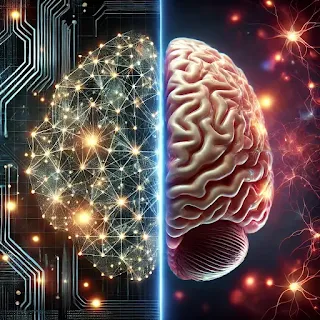Artificial Intelligence (AI) neural networks and human brains both model reality, but they do so in fundamentally different ways. While AI relies on mathematical computations and data-driven pattern recognition, the human brain interprets the world through sensory experiences, emotions, and complex cognitive processes. This article explores the key differences between these two systems of perception.
1. Data Processing vs. Experience-Based Understanding
AI neural networks process vast amounts of structured data, learning from labeled datasets and statistical correlations. In contrast, the human brain integrates lived experiences, intuition, and emotions to form a nuanced understanding of reality. Unlike AI, humans can infer meaning from ambiguous or incomplete information based on prior experiences.
2. Pattern Recognition vs. Conceptual Understanding
AI excels at pattern recognition, detecting intricate relationships within large datasets. However, it lacks true conceptual understanding. A neural network may recognize objects in an image, but it does not "know" what they are in a meaningful sense. The human brain, on the other hand, assigns context and purpose to objects, connecting them to memories, emotions, and goals.
3. Static Learning vs. Adaptive Cognition
AI models learn through training on predefined datasets and require retraining to adapt to new information. Humans, however, learn continuously, adjusting their understanding in real-time through observation, reasoning, and introspection. The brain can generalize knowledge across different situations without explicit reprogramming.
4. Symbolic Reasoning and Creativity
Humans engage in abstract thinking, creativity, and symbolic reasoning, which allows for imagination and innovation. While AI can generate content based on learned patterns, it does not truly "create" in the human sense. AI lacks self-awareness, emotions, and the ability to ponder existential questions.
5. Consciousness and Subjective Experience
Perhaps the most profound difference is consciousness. Humans possess self-awareness, emotions, and subjective experiences that shape their perception of reality. AI, despite its complexity, operates purely as an algorithmic process with no intrinsic awareness of its own existence.
Conclusion
While AI neural networks can process information at incredible speeds and recognize patterns beyond human capability, they do not truly "understand" reality in the way humans do. The brain constructs reality through sensory perception, emotions, and consciousness, while AI remains bound by data and algorithmic rules. As AI advances, the gap between human and machine cognition may narrow, but the fundamental differences in perception will remain—at least for now.

Comments
Post a Comment